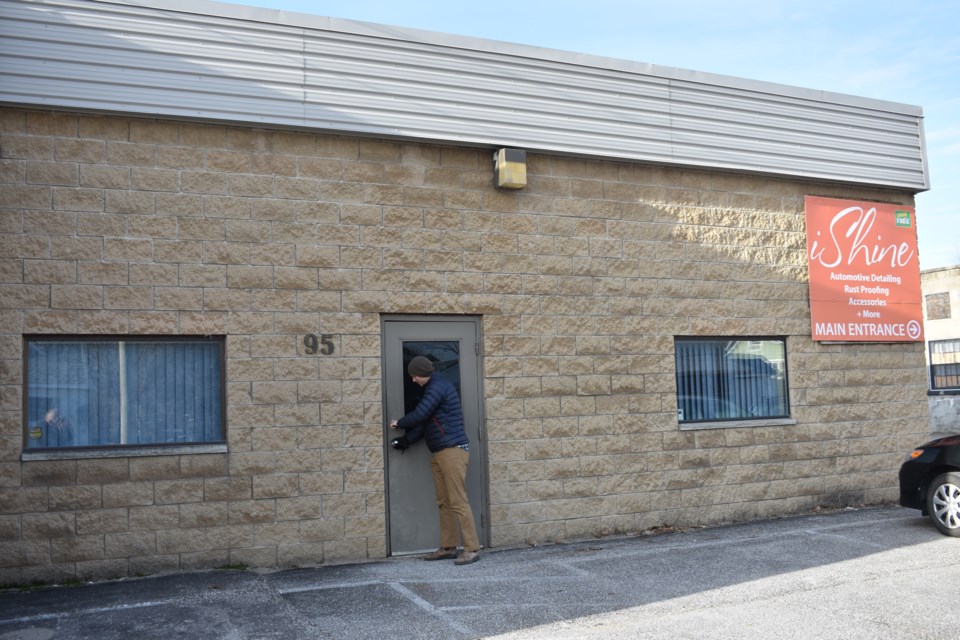Standing beside a scaffold, surrounded by saw horses and sheets of plywood, with exposed studs ready for drywall, Chris Peacock feels like a kid on Christmas morning.
That’s because after years of dwelling in a cramped, confined space, The Sharing Place Food Bank, finally, has a new home.
“It’s very exciting,” said Peacock, the food bank’s executive director. “It’s much more open; it’s a larger, welcoming space that gives our members some dignity and allows us to operate our food bank and gives us an opportunity to strengthen our programming.”
The Sharing Place’s new 4,500-square-foot home is at 95 Dufferin St., a quiet street near the hospital lined with homes on one side and some commercial and industrial operations on the other side.
“There is some anonymity to the location,” said Peacock, noting the facility’s long-time home on West Street was not ideal physically and also was in a high-profile downtown location. He said some people, because of that, would not visit the foodbank.
“There is a stigma attached to a food bank, which is sad and frustrating,” he said. “This is the moment where we try to shed that stigma.”
Food bank officials have been trying for many years to find a new location that is affordable and central.
“This (move) has been a long time coming,” said Peacock, who noted the food bank has been located on West Street since 2007. Prior to that, it was on Dunedin Street.
“This is not a cramped, tiny little space like we’ve been used to,” said Peacock inside the spacious building that sports high ceilings. “I think people will come in and feel a little more welcome, a little more safe and have a feeling that they’re in a nice place.”
Right now, the place is not so nice. The former automotive detailing operation is in need of some work. Volunteers are busy building walls and floors and cleaning up the space.
“The work is all being done by volunteers,” said Peacock, noting board member Scott Weiler and board chair Norm Sinclair have been toiling hard with volunteer contractor Jim Langman to ensure the job is completed.
They don’t have a lot of time. Peacock said the goal is to be in the new facility Jan. 30.
The 22 West St. location will be in operation until Jan. 23. Then, an army, literally, of volunteers will ensure the new location on Dufferin Street is ready to welcome members Jan. 30.
Twenty soldiers from the Canadian Forces Logistics Training Centre from Base Borden have volunteered to come to Orillia to help with the move. McGill Transportation has donated one of their transport trucks as well.
“It’s going to be a really community effort,” said Peacock. “It will be busy, there’s lot of work to be done, but it will be fun.”
While volunteers are stepping up, the community is doing the same, he said, noting staff from HGR Graham and Partners will be lending a hand to paint the premises.
Peacock said it’s a real advantage to have a large open space that can be designed to best meet the needs of the food bank and its users.
“We’ve made a conscious decision to keep the front area spacious and open even though it means the back (where the food is sorted and stored) might be a little more cramped,” he said.
With space still at a premium, Peacock said it’s important people understand what is best to donate.
“We’ve worked hard, lately, at clearly explaining the type of food we would like people to donate,” he said, noting the goal is to “curate that collection of food to meet the needs of our members.”
For example, it’s not just about emptying out your cupboards and donating Kraft dinner.
“It goes back to dignity. We don’t want to give them Kraft dinner and expired soup. We want them to have access to health food so they feel good about themselves.”
Peacock said people in poverty are most susceptible to chronic disease. “Why? Because they are eating crappy food because that’s all they can afford.”
He said officials are also combatting an intergenerational issue.
“It’s the No. 1 problem we see. How do you break that cycle? You give them a dignified space, you teach them the value of good food and, most important, provide access to healthy food. The best way to address food insecurity is income.”
Until government assistance programs improve, people will rely on food banks, he said. “We have to provide access until that income exists.”
And many rely on it. He said, on average, about 1,300 people per month use the food bank and about 200 people, each month, participate in community programming offered at the food bank.
For more information, visit The Sharing Place website.
